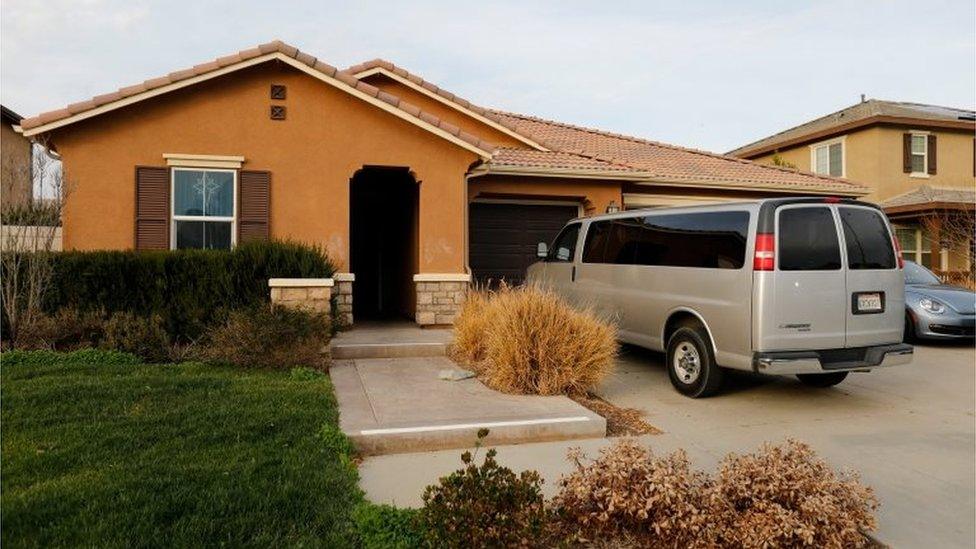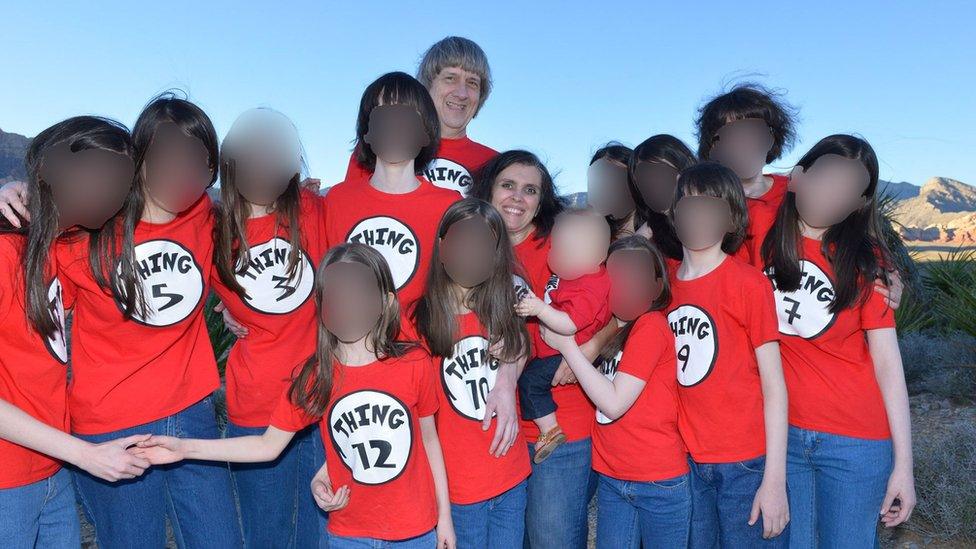Can anyone open a school at home in California?
- Published
Police chief: 'I would call that torture'
The alleged child torture case that shocked the US has raised questions about the ease with which the Turpin family were able to open a private school in their own home.
Police arrested David Turpin and his wife, Louise Anna, after they discovered several of their 13 children "shackled to their beds with chains and padlocks".
Mr Turpin is listed as the principal of Sandcastle Day School, a private school operated out of the family's home in Perris, California, according to the state's Department of Education (CDOE).
The school, listed as "non-religious" and opened in March 2011, had just six pupils enrolled, each in different grades.
Can anyone open a school in their home in California?
It is easy to home school children in most US states, and California's laws on the issue are fairly lenient, except for convicted felons.
More than 3,000 private schools were registered in the 2016-17 school year with student enrolment ranging from six to several thousand, according to the California education department's private school directory.
The database did not include schools with enrolment under six pupils.
California state laws requires children age six to 18 to attend public day school.
However, parents or guardians can pull their children out of school and educate them at home through an existing private school, a public charter or independent study programme or by opening a home-based school and filing an affidavit, according to CDOE, external.

The Turpin family ran the Sandcastle Day School out of their California home
To file a "Private School Affidavit", a school must state that enrolled students are attending full-time and take attendance daily.
However, California private schools operate outside the jurisdiction of the education department and most regulations. The state has no authority to monitor or evaluate them.
Private school teachers do not need certification and instead must merely be "persons capable of teaching", according to state law.
A 2008 ruling, external required parents who home school to receive a teaching credential after California courts heard a case of alleged child abuse by a father who had eight home-schooled children.
However, the ruling was reversed six months later following backlash in the home school community.
Should private schools be regulated?
Pam Sorooshian of the HomeSchool Association of California said she recognises the potential for people who are not educating their children properly to slip through the cracks - or worse - use the law as a guise to commit crimes.
"Most of us would do anything that was required if we thought it would prevent a child from being hurt," Ms Sorooshian told the BBC.
"We need to think hard about what would really help. It's too easy to go under the radar."
But Ms Sorooshian said she believes that regular reporting and check-ups on private schools would place more of a burden on high-functioning schools than it would prevent cases like the Turpin family.

The couple's Facebook page contains numerous family photos
Home school advocates work hard to prevent families from abusing the law, but it is inevitable that some will slip through the cracks, she added.
And if parents really want to commit crimes at home, she said, they would not bother to register.
This is particularly concerning for cases like the Turpins. Federal data shows most child abuse is committed by parents or adults living at home, according to Amy Harfeld, staff attorney and policy director for the Children's Advocacy Institute.
She emphasised the importance of ensuring children come into contact with adults outside of the home, especially doctors and teachers who are legally required to report suspected child abuse to Child Protective Services.
"The concern with home-schooling is around making sure that all children have opportunities to have meaningful contact with mandated reporters as part of their educational or medical experience," Ms Harfeld said.
But Ms Sorooshian contends that home-schooling is not the problem.
"You can't even prevent [abuse] in any school. People are people. If they want to take their children somewhere private and torture them, we can't stop them," Ms Sorooshian told the BBC.
"This also happens to children who are in school every day."
- Published16 January 2018

- Published18 January 2018
